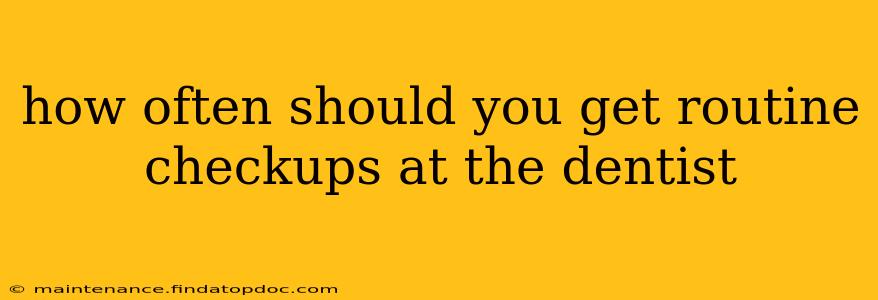Maintaining optimal oral health is crucial for overall well-being. Regular dental checkups are the cornerstone of preventive care, helping to detect and address potential problems before they escalate into more serious and costly issues. But how frequently should you schedule these vital appointments? The answer, while seemingly simple, depends on several factors. Let's delve into the recommended frequency and explore the nuances behind it.
What is the recommended frequency for dental checkups?
The general consensus among dental professionals is that most adults should aim for a routine checkup and cleaning every six months. This bi-annual schedule allows dentists to monitor your oral health, identify any emerging concerns early, and perform professional cleanings to remove plaque and tartar buildup that you can't remove yourself at home.
However, this is just a guideline. The ideal frequency can vary depending on individual circumstances.
What factors influence the frequency of dental checkups?
Several factors can influence how often you should visit your dentist:
1. Your individual oral health history:
- Pre-existing conditions: Individuals with a history of gum disease (gingivitis or periodontitis), cavities, or other oral health problems often require more frequent checkups – perhaps every three to four months – for closer monitoring and treatment.
- Risk factors: Factors like smoking, diabetes, or a family history of oral health issues can increase your susceptibility to problems and might necessitate more frequent visits.
- Response to treatment: If you've undergone recent dental procedures, such as fillings, crowns, or implants, more frequent checkups may be necessary to ensure proper healing and monitor the success of the treatment.
2. Your overall health:
Certain systemic conditions can affect your oral health and may require more frequent dental monitoring. For example, individuals with diabetes or those undergoing chemotherapy may need more frequent checkups due to increased risk of oral complications.
3. Your age:
While the six-month recommendation generally applies to adults, children and older adults may require different scheduling. Children's developing teeth often need closer monitoring, while older adults might require more frequent checkups due to age-related changes in oral health.
How often should children get dental checkups?
Children's dental health needs are unique. The American Academy of Pediatric Dentistry (AAPD) generally recommends the first dental visit by a child's first birthday or within six months of the eruption of their first tooth. After that, regular checkups should occur every six months. Earlier and more frequent checkups may be needed if there are any concerns.
What if I have no dental problems? Can I go less often?
Even if you have excellent oral hygiene practices and no apparent problems, sticking to the six-month schedule is still advisable. Many oral health issues, like gum disease, develop gradually and often show no noticeable symptoms in their early stages. Regular checkups allow your dentist to detect these problems early, preventing them from progressing and potentially saving you from more extensive (and costly) treatments later.
What happens during a routine dental checkup?
A typical checkup involves a comprehensive oral examination, including:
- Visual inspection: Checking for any signs of cavities, gum disease, oral cancer, or other abnormalities.
- X-rays: To detect cavities between teeth or other problems not visible during a visual examination.
- Professional cleaning: Removing plaque and tartar buildup from your teeth and gums.
- Discussion of oral hygiene techniques: Your dentist will review your brushing and flossing techniques and provide recommendations for improvement.
Regular dental checkups are an investment in your long-term oral and overall health. While six months is a good guideline, it's crucial to discuss your specific needs with your dentist to determine the most appropriate frequency for your individual circumstances. Don't hesitate to communicate any concerns or questions you may have. Your dentist is your partner in maintaining a healthy and happy smile.
